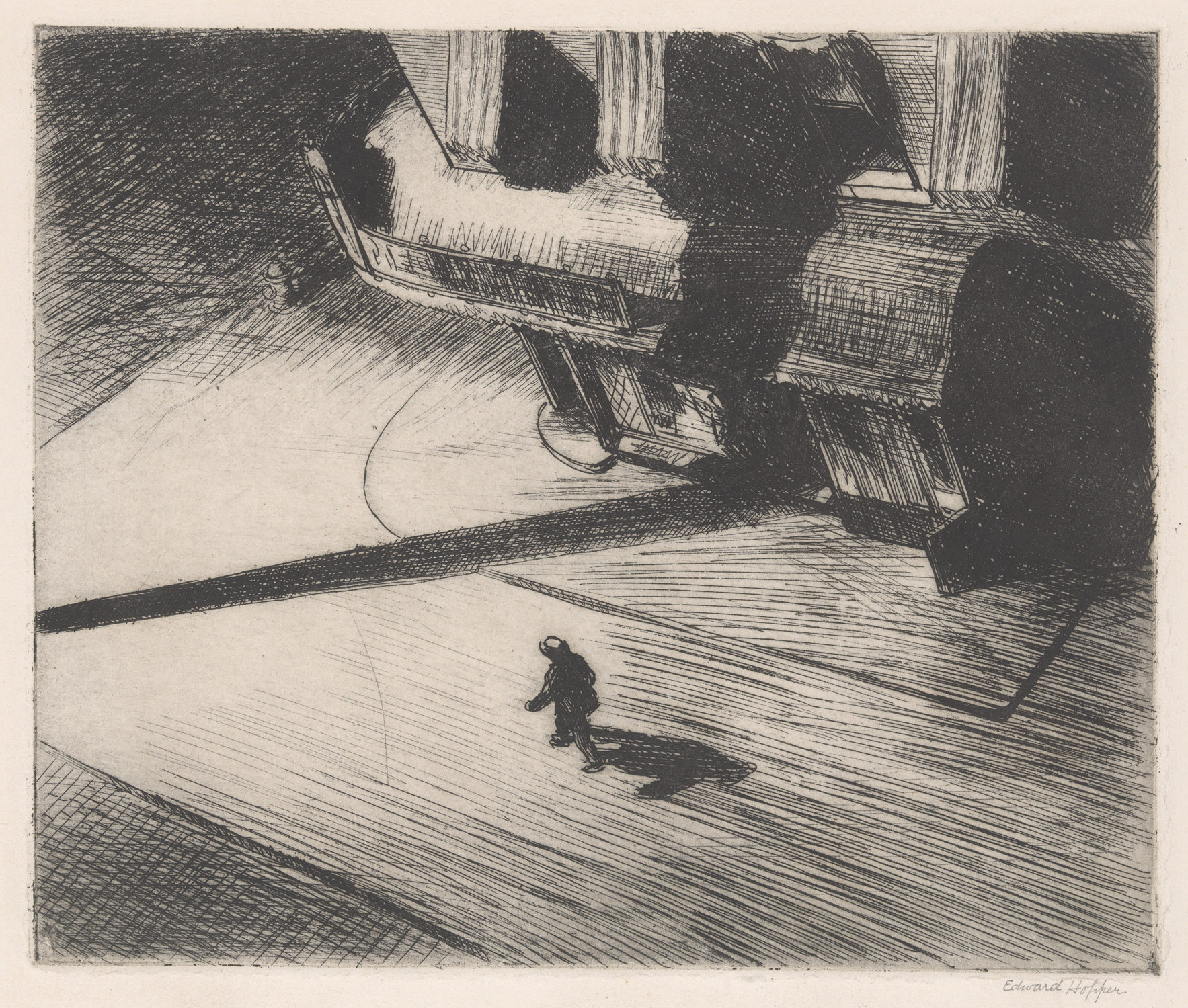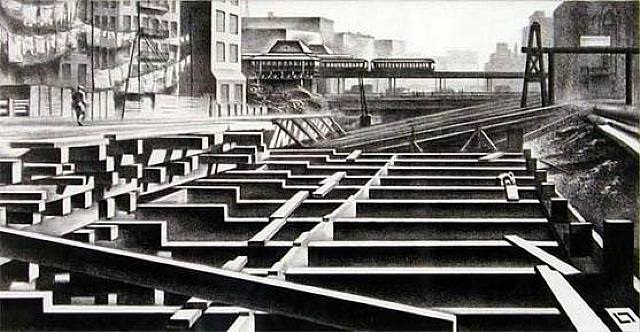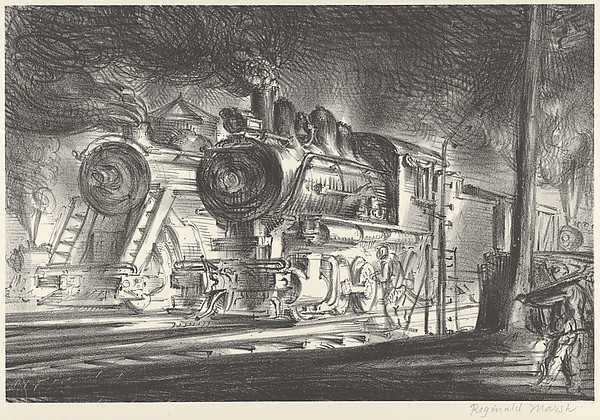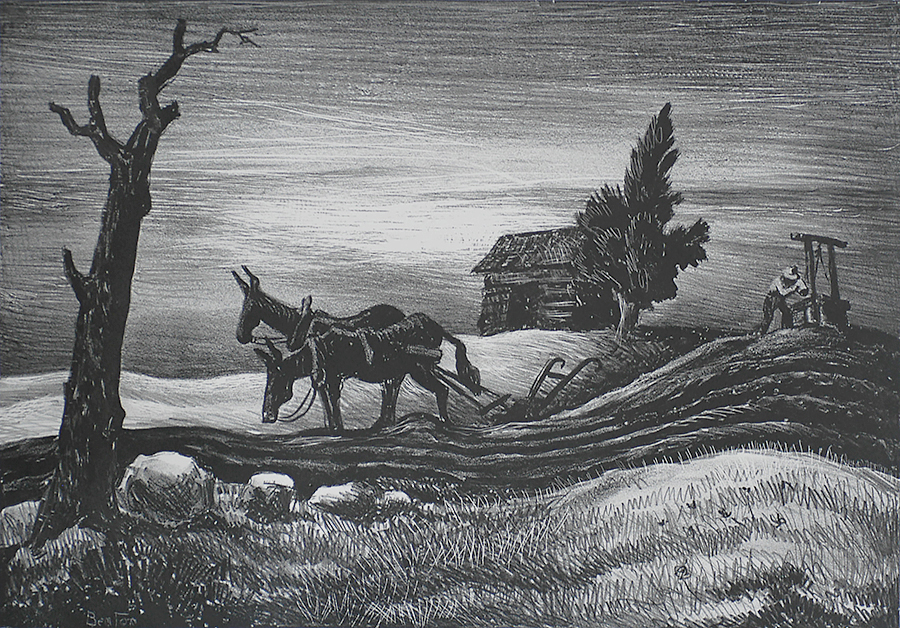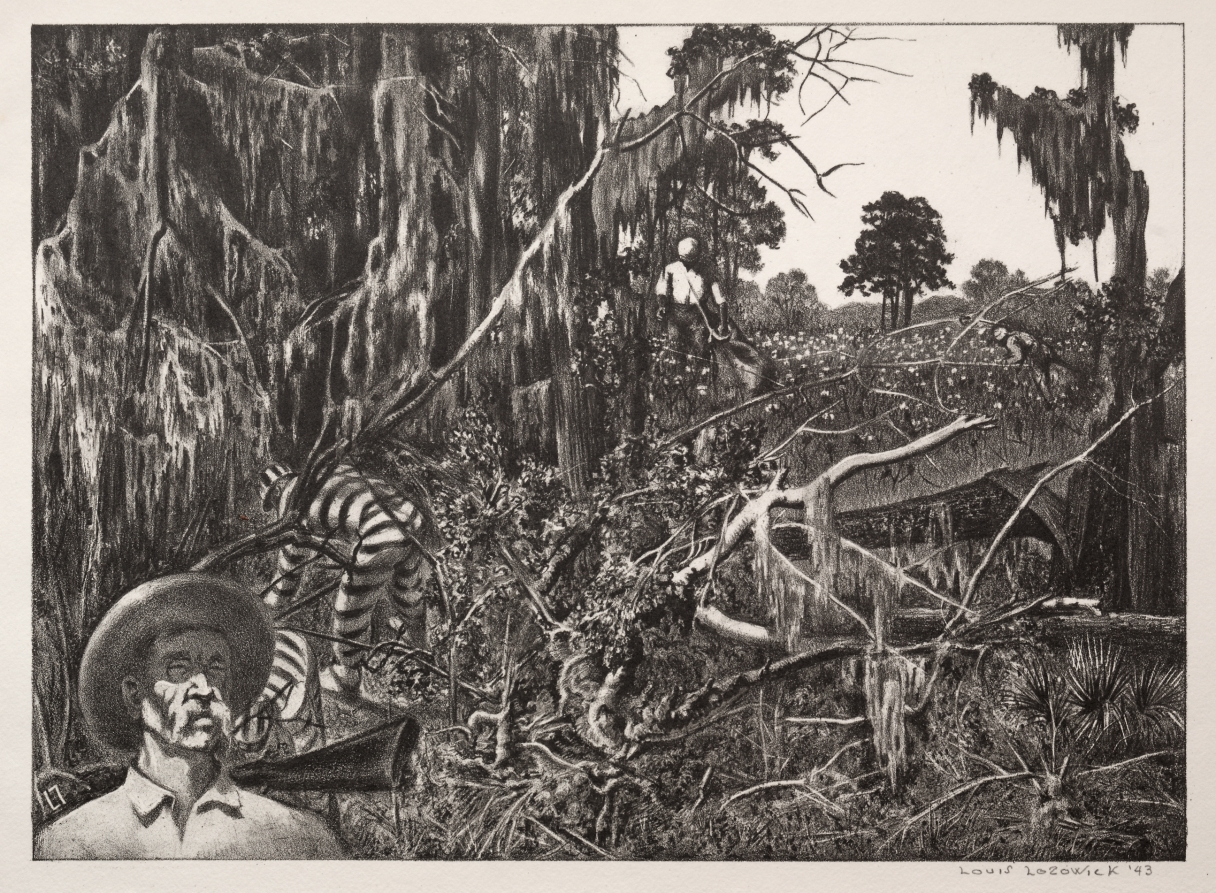San Jose Museum of Art
November 17, 2017 through July 8, 2018
During the first half of the twentieth century, the United States experienced tremendous social and cultural change: the rapid industrialization of cities, the nation’s expansion westward, the Roaring Twenties and the Great Depression, the rise of Fascism in Europe, and America’s involvement in two global wars. In response, many artists developed a uniquely American aesthetic based on realism and American subject matter. The San Jose Museum of Art will explore the era in the exhibition Crossroads: American Scene Prints from Thomas Hart Benton to Grant Wood, on view November 17, 2017 through July 8, 2018. The exhibition focuses on early twentieth-century American culture and society through lithographs, etchings, and wood engravings. The fifty-seven prints in this exhibition, produced between 1905 and 1955, encompass a broad range of art styles collectively known as “American Scene.”
“Printmaking flourished during the 1930s,” said Rory Padeken, associate curator. “Through the Federal Art Project, a unit of the US Government’s Works Progress Administration, artists were paid a weekly stipend and given access to expensive government printing presses. With the founding of Associated American Artists in 1934, even more artists could produce prints for relatively low prices—an art for the people—to be offered for sale in department stores and via mail order catalogues. Federal sponsorship and public support gave American artists an unprecedented sense of purpose and acknowledged the important contributions artists make to society.”
Donated to SJMA in the late 1970s and early 1980s, the prints in this exhibition will be on view together for the first time since 1985. Artists featured include Peggy Bacon, George Bellows, Thomas Hart Benton, Phillip Cheney, Don Freeman, Leon Gilmour, Edward Hopper, Yasuo Kuniyoshi, Clare Leighton, Louis Lozowick, Luigi Lucioni, Reginald Marsh, John Sloan, Charles Surendorf, Diane Thorne, and Grant Wood, among others.
Louis LozowickGeorgia Landscape (Georgia Moss), 1943.
Louis Lozowick . Quiet Harbor (Swimming Hole) Medium: Lithograph Year: Date of stone: 1932. Date of Impression: 1949
November 17, 2017 through July 8, 2018
During the first half of the twentieth century, the United States experienced tremendous social and cultural change: the rapid industrialization of cities, the nation’s expansion westward, the Roaring Twenties and the Great Depression, the rise of Fascism in Europe, and America’s involvement in two global wars. In response, many artists developed a uniquely American aesthetic based on realism and American subject matter. The San Jose Museum of Art will explore the era in the exhibition Crossroads: American Scene Prints from Thomas Hart Benton to Grant Wood, on view November 17, 2017 through July 8, 2018. The exhibition focuses on early twentieth-century American culture and society through lithographs, etchings, and wood engravings. The fifty-seven prints in this exhibition, produced between 1905 and 1955, encompass a broad range of art styles collectively known as “American Scene.”
“Printmaking flourished during the 1930s,” said Rory Padeken, associate curator. “Through the Federal Art Project, a unit of the US Government’s Works Progress Administration, artists were paid a weekly stipend and given access to expensive government printing presses. With the founding of Associated American Artists in 1934, even more artists could produce prints for relatively low prices—an art for the people—to be offered for sale in department stores and via mail order catalogues. Federal sponsorship and public support gave American artists an unprecedented sense of purpose and acknowledged the important contributions artists make to society.”
Donated to SJMA in the late 1970s and early 1980s, the prints in this exhibition will be on view together for the first time since 1985. Artists featured include Peggy Bacon, George Bellows, Thomas Hart Benton, Phillip Cheney, Don Freeman, Leon Gilmour, Edward Hopper, Yasuo Kuniyoshi, Clare Leighton, Louis Lozowick, Luigi Lucioni, Reginald Marsh, John Sloan, Charles Surendorf, Diane Thorne, and Grant Wood, among others.
Exhibition highlights
Peggy Bacon, Aesthetic Pleasure, 1932; lithograph; 9 ¾ x 15 ¼ inches; Museum purchase with funds from the Friends of the Museum; 1982.01
Thomas Hart Benton, Cradling Wheat, 1939; lithograph and ink; 9 ½ x 12 inches; gift of Josephine Chandler, San Jose; 1982.76
Don Freeman, Above the Stars, n.d.; lithograph; 9 ½ x 12 inches; Museum purchase with funds from the Friends of the Museum; 1982.03
Leon Gilmour, Let the Living Rise, 1937; wood engraving; 8 x 11 ½ inches; gift of the artist; 1984.32.08
Edward Hopper, Night Shadow, 1921; etching; 7 x 8 3/8 inches; gift of Yvonne and Mike Nevens, in honor of the San Jose Museum of Art’s 35th anniversary; 2004.09
Louis Lozowick¸ Subway Construction, 1931; lithograph; 6 3/8 x 13 inches; Museum purchase with funds from the Friends of the Museum; 1982.08
Luigi Lucioni, Farm in the Hills, 1937; etching; 7 ¾ x 10 3/8 inches; gift of Josephine Chandler; 1981.15
Reginald Marsh, Switch Engines, Erie Yards, Jersey City, 1948; lithograph; 9 x 13 inches; Museum purchase with funds from the Friends of the Museum; 1980.38
Grant Wood, Seed Time and Harvest, 1937; lithograph; 7 ½ x 12 inches; gift of Miss Josephine Chandler; 1981.11
Grant Wood (1891–1942)
July Fifteenth, 1938
Lithograph on paper
Grant Wood (1891–1942)
Tree Planting Group, 1937
George Bellows,The Life Class
Thomas Hart Benton, A Drink of Water 1937; lithograph. gift of Josephine Chandler, San Jose; 1982.76
Martin Lewis. Building a Babylon, Tudor City, NY. 1929. Drypoint. . 12 7/8 x 7 7/8
Thomas Hart Benton, A Drink of Water 1937; lithograph. gift of Josephine Chandler, San Jose; 1982.76
Martin Lewis. Building a Babylon, Tudor City, NY. 1929. Drypoint. . 12 7/8 x 7 7/8
Louis Lozowick Crow's Nest. 1944 lithograph on paper image: 9 5/8 x 13 1/2 in.
Louis LozowickGeorgia Landscape (Georgia Moss), 1943.
Louis Lozowick . Quiet Harbor (Swimming Hole) Medium: Lithograph Year: Date of stone: 1932. Date of Impression: 1949




